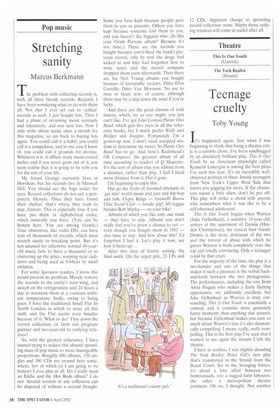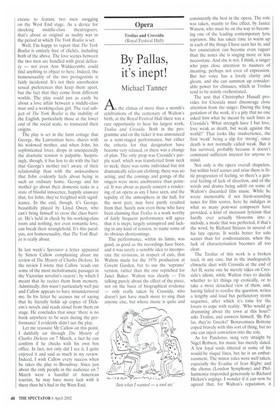This Is Our Youth (Garrick) The York Realist (Strand)
Teenage cruelty
Toby Young
It's happened again. Just when I was beginning to think that being a theatre critic is a terrible chore, I've been sandbagged by an absolutely brilliant play. This Is Our Youth by an American playwright called Kenneth Lonergan is among the best plays I've seen this year. It's an incredibly wellobserved portrait of three Jewish teenagers from New York's Upper West Side that leaves you gagging for more. If the characters sound a little alien, don't be put off. This play will strike a chord with anyone who remembers what it was like to be a self-obsessed adolescent.
This Is Our Youth begins when Warren (Jake Gyllenhaal), a sensitive 18-year-old, arrives at the apartment of Dennis (Hayden Christiensen), his cynical best friend. Dennis is the more dominant of the two and the torrent of abuse with which he greets Warren is both completely over the top and totally convincing. Only a teenager could be that cruel.
For the majority of the time, the play is a two-hander and one of the things that makes it such a pleasure is the verbal backand-forth between the two protagonists. The performances, including the one from Anna Paquin who makes a fairly fleeting appearance, are uniformly excellent, but Jake Gyllenhaal as Warren is truly outstanding. This Is Our Youth is essentially a comedy and it contains more genuinely funny moments than anything else around, but because Gyllenhaal makes you care so much about Warren's fate it's also dramatically compelling. I mean, really, really compelling. This is the first play I've seen that I wanted to see again the instant I left the theatre.
I have to confess, I was slightly dreading The York Realist, Peter Gill's new play that's transferred to the Strand from the Royal Court. Set in the Swinging Sixties, it's about a love affair between two homosexuals, one a rugged farm labourer, the other a metropolitan theatre producer. Oh no, I thought. Not another
excuse to feature two men snogging on the West End stage. As a device for shocking middle-class theatregoers, that's about as original as nudity was in the period in which The York Realist is set.
Well, I'm happy to report that The York Realist is entirely free of cliches, including both of the above. The love scenes between the two men are handled with great delicacy — not even Ann Widdecombe could find anything to object to here, Indeed, the homosexuality of the two protagonists is fairly incidental. It's not their unorthodox sexual preferences that keep them apart, but the fact that they come from different worlds. The play could just as easily be about a love affair between a middle-class man and a working-class girl. The real subject of The York Realist is the inability of the English, particularly those at the lower end of the social scale, to transcend their origins.
The play is set in the farm cottage that George, the Lawrentian hero, shares with his widowed mother, and when John, his sophisticated lover, drops in unexpectedly the dramatic tension is palpable. Surprisingly, though, it has less to do with the fact that George's mother isn't aware of their relationship than with the awkwardness that John evidently feels about being in such an ordinary home. George and his mother go about their domestic tasks in a state of blissful innocence, happily unaware that, for John, they're freighted with significance. In the end, though, it's George, beautifully played by Lloyd Owen, who can't bring himself to cross the class barrier. He's held in check by his working-class roots and nothing, not even romantic love, can break their stranglehold. It's this paralysis, not homosexuality, that The York Realist is really about.
In last week's Spectator a letter appeared by Simon Callow complaining about my review of The Mystery of Charles Dickens. In the review I wrote that Callow 'reads out some of the most melodramatic passages in the Victorian novelist's oeuvre', by which I meant that he recites them from memory. Admittedly, this wasn't particularly well put and Callow appears to have misunderstood me. In his letter he accuses me of saying that he literally holds up copies of Dickens's novels and reads aloud from them on stage. He concludes that since 'there is no book anywhere to be seen during the performance' I evidently didn't see the play.
Let me reassure Mr Callow on this point. I dutifully sat through The Mystery of Charles Dickens on 7 March, a fact he can confirm if he checks with his own box office. In fact, not only did I see it, I quite enjoyed it and said as much in my review. Indeed, I wish Callow every success when he takes the play to Broadway. Since just about the only people in the audience on 7 March were a handful of American tourists, he may have more luck with it there than he's had in the West End.































































 Previous page
Previous page